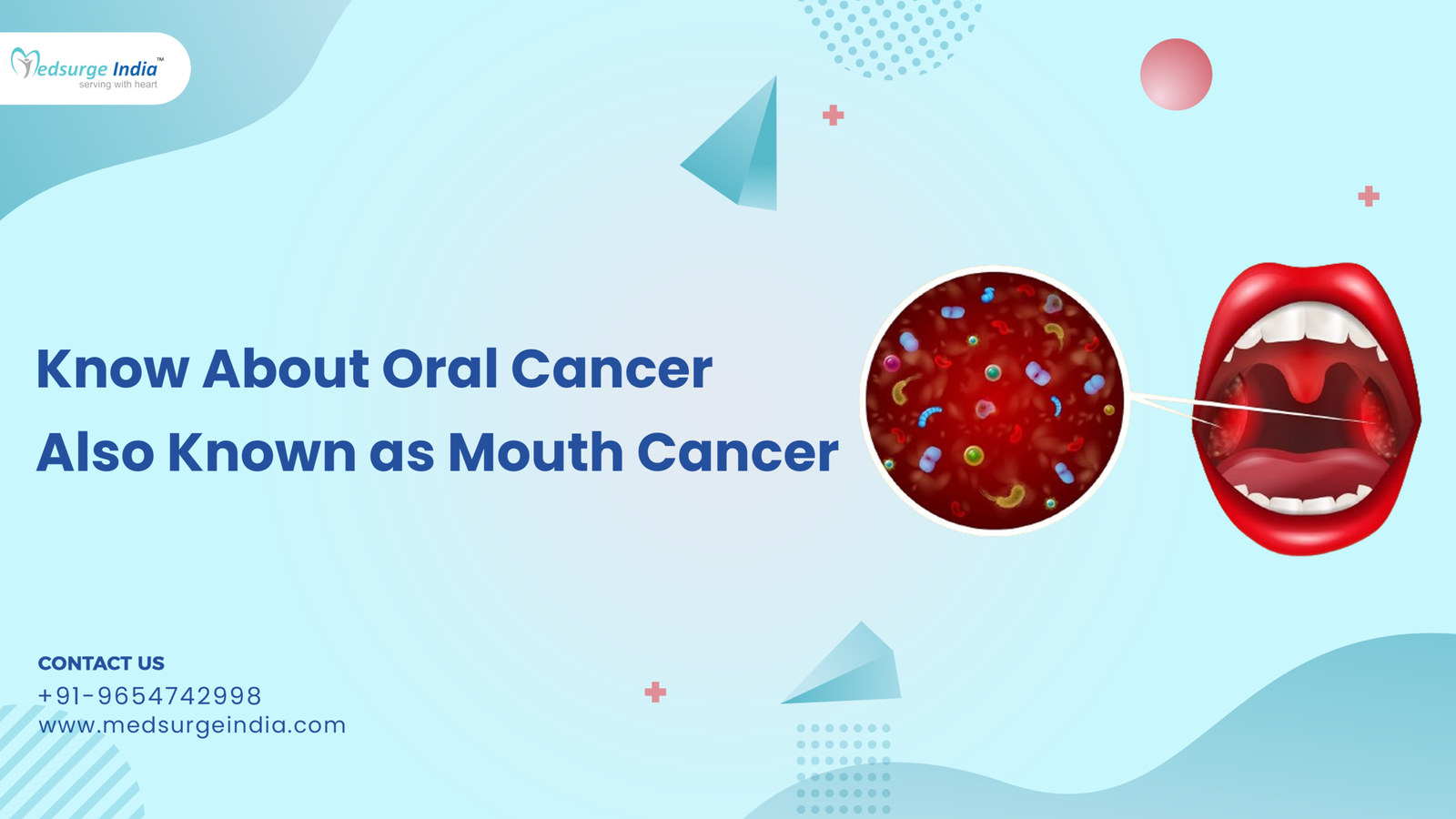
Know About Oral Cancer Also Known as Mouth Cancer
Oral cancer, also known as mouth cancer, refers to the general category of cancer that impacts the interior of the mouth. It may manifest as common issues such as lip abnormalities or mouth sores that bleed. However, the key distinction between a typical problem and potential cancer lies in the fact that these changes persist and do not resolve independently.
If left untreated, oral cancer has the potential to spread to various regions of the head and neck, encompassing the mouth and throat. It is worth noting that around 63% of individuals diagnosed with oral cavity cancer survive for at least five years.
Oral cancer has the potential to impact both your mouth and your oropharynx. The oropharynx encompasses various areas such as the tongue, the roof of your mouth, and the visible middle part of your throat when your mouth is fully open. When cancer develops in the oropharynx, it is referred to as oropharyngeal cancer. However, this blog specifically concentrates on oral cancer within the mouth, also known as the oral cavity.
Types of Oral Cancer/ Mouth Cancer
A carcinoma refers to a cancer that develops either on the inner or outer layer of the body. These types of cancer are classified based on the specific cells in which the cancer originates.
The most prevalent form of mouth cancer is squamous cell carcinoma, accounting for 90% of cases. Squamous cells are present in various body parts, including the mouth’s interior and beneath the skin.
Less frequent forms of oral cancer consist of:
- Oral malignant melanoma begins in melanocytes, the cells responsible for skin pigment
- Adenocarcinomas develop inside salivary glands.
Causes of Oral Cancer
Mouth cancers arise when the cells in the lips or mouth undergo genetic changes (mutations) in their DNA. The DNA of a cell contains the instructions that govern its functions. These mutations alter the instructions, causing the cells to continue growing and dividing instead of undergoing natural cell death. Consequently, the abnormal mouth cancer cells accumulate and form a tumor. Over time, these cells may spread within the mouth and extend to other regions of the head, neck, or even other parts of the body.
The most common origin of mouth cancers is the flat, thin cells known as squamous cells, which line the lips and mouth’s interior. The majority of oral cancers are classified as squamous cell carcinomas. The exact cause of the mutations in squamous cells that lead to mouth cancer remains unclear. However, medical professionals have identified certain factors that may increase the risk of developing mouth cancer.
Symptoms of Oral Cancer
Oral cancer presents various signs and symptoms that can often be mistaken for ordinary mouth issues or changes. One such indication is the presence of patches inside the mouth that cannot be scraped away. These patches may indicate pre-cancerous conditions.
Several conditions manifest as patches in the mouth and throat, each with different colors:
- Leukoplakia: These patches are flat and appear white or gray in the mouth or throat.
- Erythroplakia: These patches are slightly raised or flat and appear red. They may bleed when scraped.
- Erythroleukoplakia: These patches display a combination of red and white colors.
Common signs and symptoms of oral cancer include:
- Sores on the lip or inside the mouth that easily bleed and do not heal within two weeks.
- Rough spots or crusty areas on the lips, gums, or inside the mouth.
- Unexplained bleeding in the mouth.
- Numbness, pain, or tenderness in the face, neck, or mouth without an apparent cause.
- Difficulty chewing, swallowing, speaking, or moving the jaw or tongue.
- Unintentional weight loss.
- Earache.
- Chronic bad breath.
Diagnosis For Oral Cancer
During your regular checkups, your dentist has the ability to detect potential oral cancer. In the event that they do find any concerning signs, they may proceed with preliminary tests or refer you to an oral and maxillofacial surgeon, or a head and neck surgeon. These specialists are commonly known as ear, nose, and throat (ENT) specialists.
There are several tests that can be conducted to diagnose oral cancer:
- Physical examination: Your healthcare provider will thoroughly examine the inside of your mouth and may also feel around the area. Additionally, they will inspect your head, face, and neck for any indications of pre-cancer or cancer.
- Brush biopsy (also known as scrape biopsy or exfoliative cytology): Healthcare providers use a small brush or spatula to gently scrape the suspicious area in order to collect cells for further examination to determine if cancer is present.
- Incisional biopsy: Your healthcare provider will remove small pieces of tissue from the affected area to obtain cells that will be examined for the presence of cancer.
- Indirect laryngoscopy and pharyngoscopy: Your healthcare provider will use a small mirror attached to a long, thin handle to examine your throat, the base of your tongue, and a portion of your larynx (voice box).
- Direct (flexible) pharyngoscopy and laryngoscopy: In some cases, an endoscope may be used to visualize areas of your throat and mouth that cannot be seen with mirrors. An endoscope is a thin, flexible tube equipped with a light and viewing lens.
Treatments For Oral Cancer
The location and stage of your disease, together with your general health and personal preferences, will all influence your treatment options for mouth cancer. You might receive only one kind of cancer treatment, or you might receive several different kinds of treatments. Chemotherapy, radiation, and surgery are available treatment options. Talk to your doctor about your options.
Surgery
For oral cancer, surgery could involve:
- Surgery to get rid of the growth: To be sure all cancer cells are gone, your surgeon could remove the tumor along with a margin of surrounding healthy tissue. Minor surgery may be used to eliminate smaller malignancies. More involved procedures can be necessary for larger tumors. For example, in order to remove a larger tumor, you might have to have part of your tongue or jawbone removed.
- Surgery to remove a neck-spreading malignancy: Should cancer cells have progressed to the lymph nodes in your neck, or if there’s a strong likelihood of this occurring given the size or extent of your cancer, your surgeon can suggest a neck dissection treatment to remove the lymph nodes and associated tissue. Any cancer cells that may have migrated to your lymph nodes are removed during neck dissection. It’s helpful in figuring out whether you’ll require more care following surgery.
- Oral reconstruction surgery: Following the cancer removal procedure, your physician can suggest reconstructive surgery to restore your mouth and enable you to speak and eat normally again. To rebuild your mouth, your surgeon might use skin, muscle, or bone transplants from other areas of your body. Your natural teeth may potentially be replaced with dental implants.
Helpful: Oral Cancer Surgery Cost in India
Additional Therapies For Oral Cancer
Medical professionals may combine surgery with additional therapies, such as:
- Radiation therapy: To either kill or stop the growth of cancer cells, radiation therapy employs powerful energy beams. Radiation therapy may be given in conjunction with other treatments by your healthcare professional.
- Targeted therapy: This cancer treatment selectively targets and destroys specific cancer cell types while sparing healthy cells. It may involve the use of medications or other substances. Proteins from the immune system called monoclonal antibodies are produced in laboratories and are used to treat cancer.
- Chemotherapy: Your doctor may prescribe anti-cancer medications, such as therapies that target the majority of body parts, to eradicate cancer cells.
- Immunotherapy is a cancer treatment that works by enlisting your body’s defenses against the illness. The course of treatment is occasionally referred to as biological therapy.
Helpful: Best Oncologists in India
Prevention
You can actively participate in avoiding oral cancer by taking preventative measures. With these suggestions, you can aid in the prevention of mouth cancer:
- Try quitting or cutting back if you use a water pipe, smoke tobacco, or chew tobacco. Consult your physician about programs to help you stop smoking.
- If you consume alcohol, make sure to do it in moderation.
- Do not forget to use sunscreen. Apply sunblock and UV-AB-blocking sunscreen to your face.
- Obtain a human papillomavirus vaccination.
- Consume a diet rich in variety.
- Get frequent dental examinations. Oral cancer screenings should be done every three years for those under 40 and annually for those over 40.
Helpful: Top Cancer Hospitals in India






